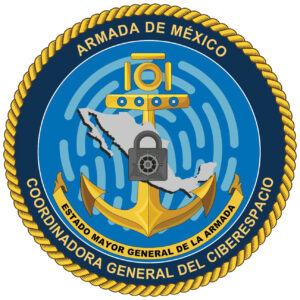Mexico’s Secretariat of the Navy oversees the country’s cyber force and focuses on the growing use of artificial intelligence in the defense sector.
Governments and societies worldwide have become increasingly dependent on algorithms with autonomous intelligent machines facilitating daily tasks and decisions previously made by humans. Artificial intelligence (AI) continues to grow exponentially, bringing innumerable advantages for large-scale information gathering. It learns from itself by continuously improving its algorithms in increasingly complex situations.
The Mexican Navy’s (MARINA) General Coordinator of Cyberspace trains and develops the cyber force and acquires advanced technologies. It adapts to current needs in cyber defense and cybersecurity operations, establishing itself as one of Mexico’s key institutions with highly qualified personnel in the fifth domain of warfare: cyberspace. These efforts help maintain the integrity, stability and permanence of the Mexican state.
AI’s applications are extensive, but one of the areas of greatest impact is in global security and defense in cyberspace. In a universe where conflicts have become constant, where threats are transferred to cyberspace, and where invisible cybercriminals can attack and breach technological systems and critical infrastructure, AI becomes a fundamental cybernetic weapon for military strategies and operations. That leads to important questions for the development of military operations in cyberspace and the possible ethical consequences — including regulation of the legal framework — that must be studied and approved by organizations and governments of the world to protect the fundamental rights of humanity.
 AI’s ability to rapidly analyze and process information from various physical and virtual sources — including the web, deep web, dark web, satellites, internet-connected devices, smart cameras and drones — enhances real-time decision-making. This analysis leads to a reduction of risk. Also, AI supports the development of new cyber weapons for defense, capable of inflicting massive damage on enemy entities, including criminal organizations and cyber terrorists.
AI’s ability to rapidly analyze and process information from various physical and virtual sources — including the web, deep web, dark web, satellites, internet-connected devices, smart cameras and drones — enhances real-time decision-making. This analysis leads to a reduction of risk. Also, AI supports the development of new cyber weapons for defense, capable of inflicting massive damage on enemy entities, including criminal organizations and cyber terrorists.
The military arms race in cyberspace has begun, driven by AI’s ability to predict, identify, and respond to and learn from conflicts and vulnerabilities that affect civilian, governmental and academic actors.
“States and industry alike have intensified their efforts to develop increasingly sophisticated systems at an exponential rate and without the necessary guardrails, creating a de facto arms race for AI superiority,” Jimena Sofía Viveros Álvarez, a Mexican lawyer and member of the U.N. secretary-general’s High-Level Advisory Body on AI, wrote in a November 2024 post on Opinio Juris, a blogging website that focuses on international law.
However, the same AI technologies that enhance defense and security also are available to cybercriminals. It provides the opportunity to develop malware to attack, penetrate, and take control of all kinds of systems, devices and critical infrastructures, which leads to another field of study — cyber criminology.
Wars and conflicts are evolving with the emergence of new technologies and autonomous entities. Cyberspace is becoming the main battlefield of our time, where the main conflicts between nations will take place as a result of the extraordinary capacity and adoption of these technologies.
Ethical and legal systems have traditionally evolved to maintain societal control, not to address challenges posed by machines. Therefore, many ethical and legal questions persist. How can autonomous and intelligent weapons be held responsible? Who is to blame if a robot or system commits war crimes? Who — or what — should be prosecuted: the weapon itself, the Soldier operating it, the commanding officers or the corporation that manufactured it?
Viveros also warns that some AI technologies “risk lowering the threshold of the use of force and raise challenges for compliance with international humanitarian law as well as human rights violations.”
There is an ethical need to maintain a constant level of human control, ensuring that there is always a responsible individual, and that accountability for their actions and decisions is verifiable.

